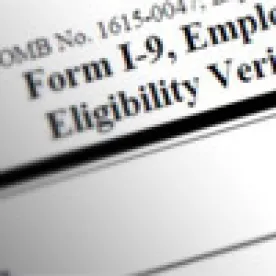It depends. Often during an inspection visit, Immigration and Customs Enforcement (ICE) will request I-9 forms for everyone present, treating all as employees, even if the company classifies them as independent contractors. After the NLRB decision in Browning-Ferris Industries, which found a subcontractor to be a joint employer in the collective bargaining context, employers are even more concerned that this expanded definition could spread, making employers subject to liability for not completing I-9s.
However, there is hope. In the I-9 context, the regulations (8 C.F.R. § 274a.1(j)) define independent contractors, for whom no I-9s are needed, as entities or individuals who carry on an independent business or contract to do a piece of work using their own means or methods and are subject to control by the employer only as to results. The factors used in the determination by ICE include: whether the services of the contractor are generally made available to the public; whether the contractor supplies his/her own tools and materials, has other clients and decides the order, and controls the sequence and hours of the work.
In August 2015, in Saidabror Siddikov, before the Office of the Chief Administrative Hearing Officer in the Executive Office for Immigration Review, an Administrative Law Judge, relying on this regulation and on the traditional definition of employees, found a small janitorial service was an independent contractor, not an employee, and provided guidance for employers who believe their vendors are not I-9 employees. Using this guidance for those concerned about being classified a joint employer, employers should immediately determine whether an individual is an independent contractor, employee or joint employee and then act in a consistent manner to the determination, particularly on I-9s and immigration sponsorship.
A true joint employer may be caught between a rock and a hard place: complete an I-9 for an individual it controls but is not on the payroll or not? Completion of the I-9 is one indication of employee status; not completing the I-9 may mean an employer will incur fines and penalties. Employers should conduct an individual analysis, considering its industry, the terms of the vendor contract, and the individuals engaged, before the ICEman cometh.




 />i
/>i

